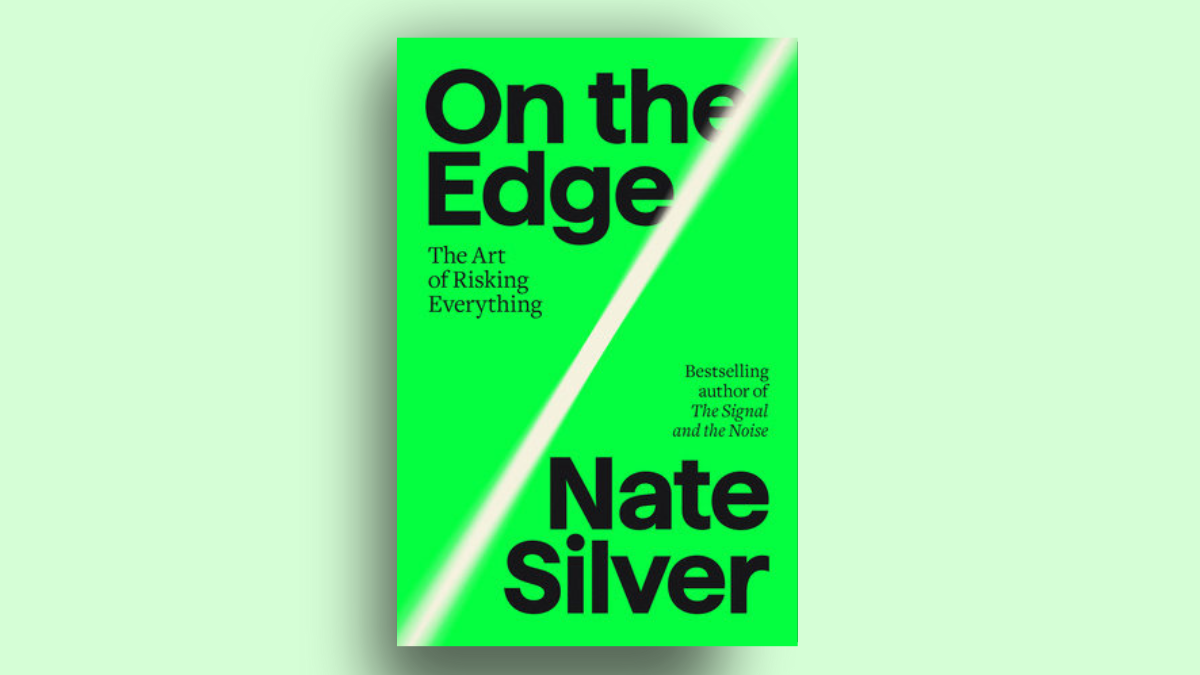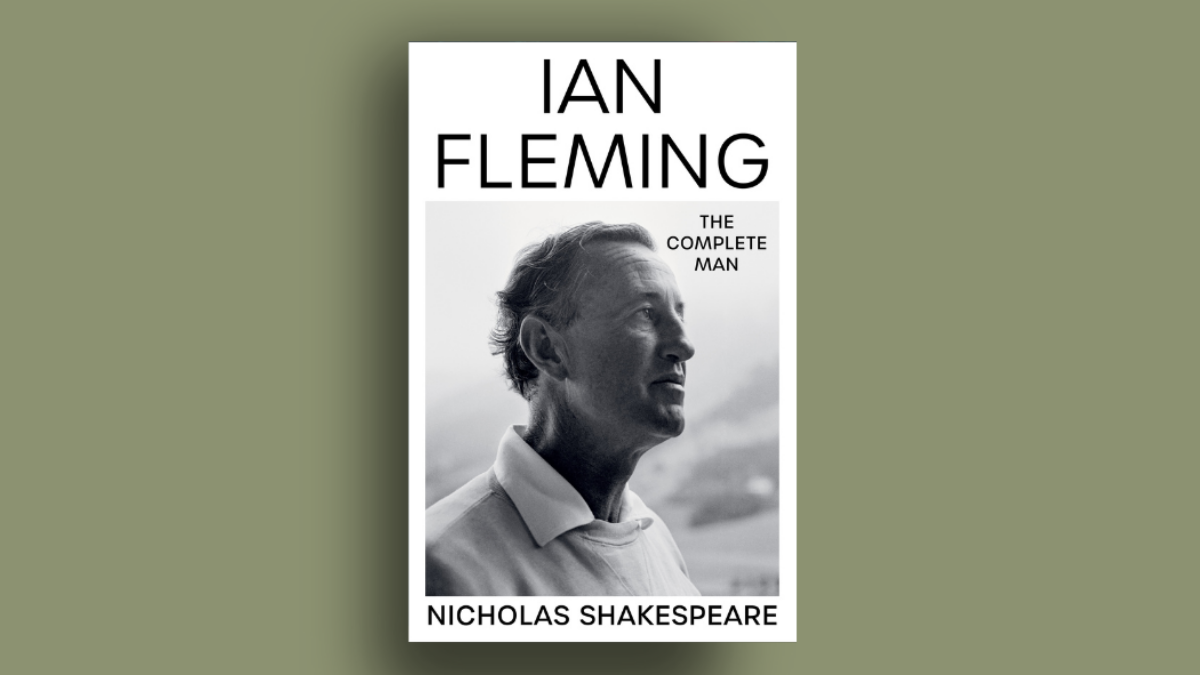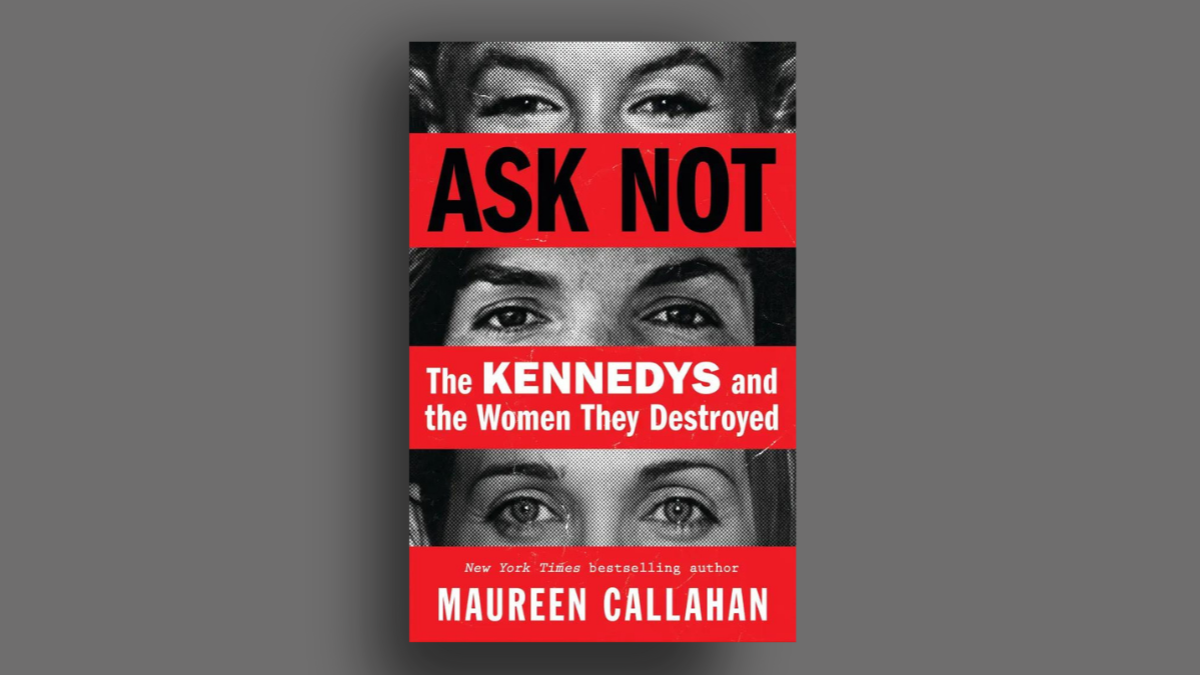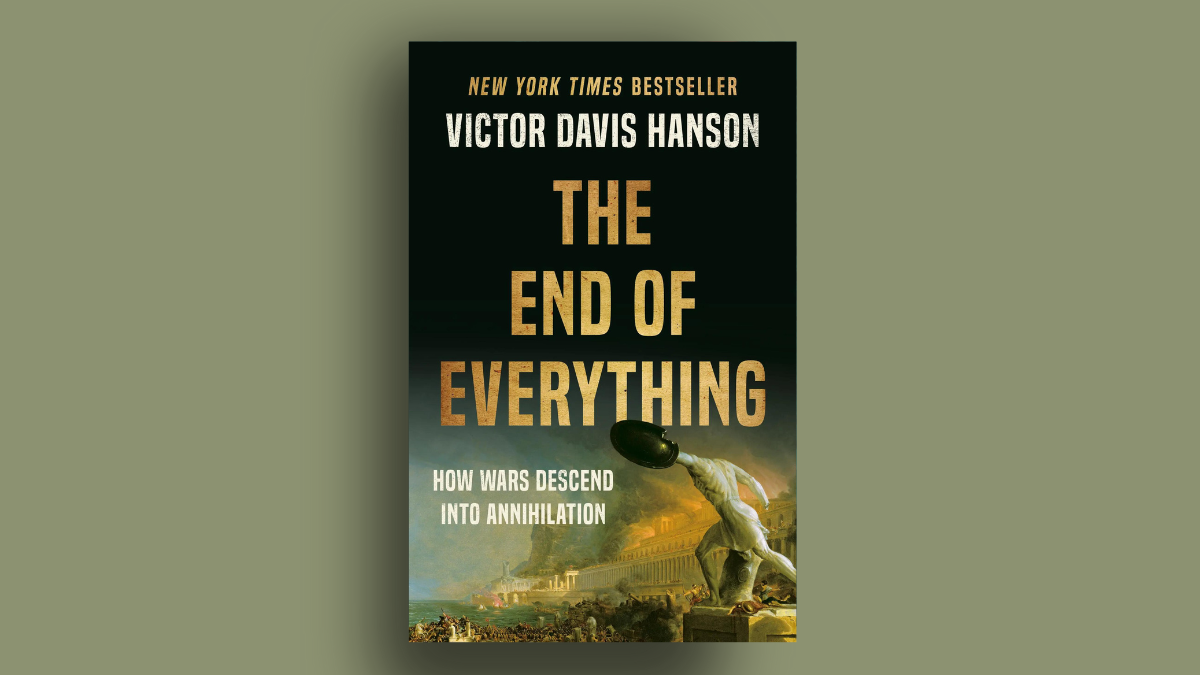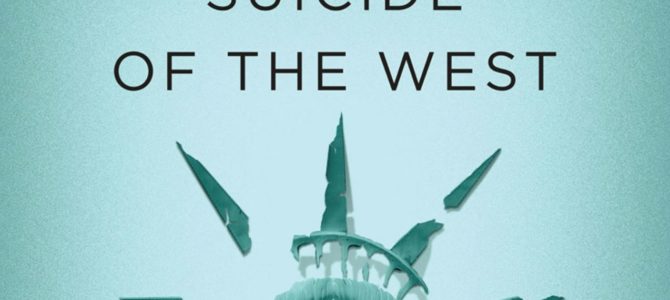
About 300 years ago, humanity stumbled into a Miracle that has provided us unprecedented liberty and prosperity. This blessing is liberal democratic capitalism.
The Miracle was not a deliberate creation. It resulted from an unplanned convergence of events and ideas in the northwestern corner of Europe, and its success did not change human nature. We are the same as we were before it, and basically the same as we were before civilization.
Thus, for all of its obvious benefits, the Miracle often feels unnatural to us. Unless we strive to remember this, we will forget how much the Miracle has done for us and destructively indulge our inner tribal primates. We may commit cultural suicide out of ignorance and ingratitude.
This is the story Jonah Goldberg tells in his new book, Suicide of the West. It is a good tale, presented with an appealing blend of political theory and popular punditry, and it offers many salutary lessons and reminders of the blessings we enjoy and the need to actively preserve them (and yes, he really does call the advent of liberal democratic capitalism “the Miracle”). The book’s weaknesses are that it is too besotted with modernity and does not address the ways liberalism sabotages itself. The individualistic pursuit of happiness does not actually seem to make us very happy, and it threatens the civil society liberalism depends on.
Poverty and Violence
Goldberg begins by reminding us of the remarkable epoch we live in. He writes that the “natural state of mankind is grinding poverty punctuated by horrific violence terminating with an early death. It was like this for a very, very long time.” The creation of agriculture and the beginnings of civilization did not change this very much for most people, though it did allow the human inclination toward violence to get organized enough to provide the basis for government. Human nature had not altered. People were still tribal primates, and human life still tended to be poor, violent, and short.
Although the ills of pre-modern human life were undoubtedly legion, the soil in which the Miracle grew was enriched by centuries of human effort and achievement. However, Goldberg’s emphasis on the Miracle as “an unplanned and glorious accident” sometimes makes him unappreciative of the accomplishments of the pre-Miracle past. Indeed, he has a tendency to libel the past, as illustrated by his poorly sourced claim that medieval Europeans were particularly inclined to inventive tortures. In fact, many purported medieval torture devices, including the infamous Iron Maiden, are later creations produced for sensationalist “torture museums.”
This denigration of the premodern past also contributes to a too-narrow philosophical framework. To explain the Miracle and the reaction against it, he focuses on the distinction between Enlightenment reason and reactionary Romanticism, casting John Locke as the philosophical hero and Jean-Jacques Rousseau as the villain. He believes he is defending the former, which he credits for democracy and capitalism, against the latter, which he blames for modernity’s ingratitude for the Miracle. But Enlightenment rationalism provoked the backlash of Romanticism because they are opposite sides to the same counterfeit coin.
There are other options, thank God, than Locke and Rousseau. While it is understandable that Goldberg did not want to attempt a philosophical treatise, he neglects to even try to define what he means by “reason,” prompting one to echo Alasdair MacIntyre and ask: Which Rationality? There is a lot of good material in his discussions of capitalism, liberal democracy, and the American founding, but the discussion is shoehorned into an unnecessarily limited theoretical frame.
Tribal Mascots
Goldberg regains his footing as his gaze returns to our own time, analyzing the progressive era and our increasingly arrogant elites who believe themselves entitled to rule. Despite their often-impressive educational pedigrees, members of this class tend to be ignorant about the past, and therefore dismissive of the blessings of the Miracle has created in our time.
Students at prestigious universities who perpetually complain about how oppressed they are exemplify this howling ingratitude. And members of this class control the administrative state—the unaccountable leviathan that has fundamentally altered the relationship between citizen and state in this country, making our country more regulated and less liberal and democratic.
Diagnosing the destructive forces plaguing our polity and culture is among his strengths, so Goldberg really hits his stride in addressing identity politics and pop culture. Identity politics and tribalism tear us apart and encourage reflexive hatred. Our pop culture is primitive, self-worshiping and indulges our worst impulses.
Also, the two increasingly overlap, as illustrated by the recent Kanye West/Donald Trump crossover—social media lit up because a rapper, who is married to a reality TV star, praised a gameshow host turned president. A few days earlier, country music legend Shania Twain was pressured into an apology because she said she would have voted for Trump had she not been Canadian. Politics is treated as entertainment, and entertainers are treated as tribal mascots.
Consequently, although Goldberg is critical of President Trump, he recognizes him as more of a catalyst than a cause. Trump has inflamed tribal tendencies and resentments, but they did not originate with him—he just sped up the reaction rate. Elite callousness and disdain toward much of the country invited a ferocious backlash, and partisans on all sides are now justifying their own dreadful behavior by pointing to the excesses of the other factions.
This polarization is partly fueled by declining participation in civil society, which leaves people searching for sources of identity and meaning, with some settling on partisan politics. The loudest voices screaming into the Internet void are not doing so out of a concern for policy, but because it satisfies psychological urges, from the desire to be cruel to the need for purpose.
The spectacle and ritual of tribal politics produces cycles of conflict and revenge, often untethered from actual policy goals. For instance, the point of the Obama administration’s prolonged effort to force elderly nuns to fund and facilitate the distribution of birth control was not policy, but spiking the football on culture war opponents. Speaking of football, Trump’s Twitter tirades about NFL protests had a similar tribal purpose. Policy is boring; outrage is fun—so why not let the inner ape out for some poop-flinging?
Family vs. Liberal Individualism
But as Goldberg reminds us, the blessings of our civilization cannot be taken for granted. “Burn it down” is the battle cry of idiot children who assume there will always be adults standing by to control the flames. It stems from ignorance about the actual conditions of mankind for the millennia before modern civilization, or what has happened when that civilization has burned down. We are never far from the natural state of humanity, which is brutal tribal barbarism or autocratic empire.
What does the Miracle offer as an alternative to tribalism? Goldberg’s answer is civil society: We should find meaning and fulfillment in family, church, friendship, and the myriad associations that mediate between individuals and the state. These provide the purpose to life that liberal democratic capitalism itself cannot. The Miracle provides freedom and prosperity, while allowing everything from family to bowling leagues to offer reasons for living. This is a plausible answer, but it exposes Goldberg’s worst omission.
The primary flaw that keeps this book from greatness is that it does not seriously address the claim that liberalism destroys the social and familial resources that support it. Goldberg is surely familiar with this argument—he even cites Patrick Deneen, who is one of its foremost apostles. Goldberg acknowledges the vital importance of civil society and families to liberal democracy. From the family to the variety of intermediary non-state institutions and associations, liberal democratic capitalism depends on commitments and virtues it does not generate. The state cannot replace these, and its interference in the associations that do is often harmful.
But Goldberg does not address the charge that liberalism’s emphasis on individual autonomy and indulgence of the passions (rather than restraint) vitiates the bonds of families and associations that it relies upon but cannot itself produce. Liberal individualism undermines the foundations it is built on.
The problem this poses to Goldberg is illustrated by his embrace of Locke, whose rationalistic and individualistic ideas are poison to civil society and the family. Locke presented the family in individualistic and contractual terms drawn from his theory of government. Regarding marriage, he inquires whether “this compact, where procreation and education are secured, and inheritance taken care for, may not be made determinable, either by consent, or at a certain time, or upon certain conditions, as well as any other voluntary compacts, there being no necessity in the nature of the thing, nor to the ends of it, that it should always be for life.” Marriage, according to Locke, is not a lifelong union ordered to the natural good of humanity, but a contract that provides a personally and socially useful means for the stable propagation of the species.
This was a natural outgrowth of Locke’s anthropology, in which, Leo Strauss observed, the individual, “had become the center and origin of the moral world … the individual is emancipated from those social bonds which antedate all consent or compact.” Russell Kirk thought similarly, writing that “Locke’s emphasis on primitive freedom tends toward social atomism …Utility, not love, is the motive of Locke’s individualism.” Locke’s theories of selfish individualism make the family into a temporary contract for personal satisfaction, with the only natural constraint being that obligations to children must be honored.
The anti-family views of Goldberg’s chosen champion illuminate how the social and familial bonds that are needed to sustain liberalism may be destroyed by the selfish passions liberal individualism unleashes and endorses. Far from elevating reason, liberalism indulges and elevates irrational desire. This is why Locke rejected the idea of objective human goods and argued that families, marriage, sexual mores, and even society itself, exist to further individuals’ subjective ends. Reason, in the liberal scheme, acts to fulfill desire, not to regulate and direct it to real goods.
Suicide Is a Choice
This side of Locke demonstrates how liberal democratic capitalism depends on virtues that it cannot create, and which it actively undermines. It is unfortunate that Goldberg did not address these critiques of Locke and liberalism, either by disputing them directly or exploring how it may be possible to ground liberty, free markets, and popular sovereignty in something other than the “Lockean Revolution” of hedonistic individualism.
He would not have had to look far in the attempt. At its best, America offers an example of liberty without libertinism, markets without materialism, and democratic accountability within a constitutional republic. If Goldberg had explored these dynamics, perhaps by making Edmund Burke his intellectual avatar rather than Locke, this might have been an exemplary work of popular political theory.
But it is still good as it is, for Goldberg provides a timely reminder that civilization is a hard-won achievement that should be cherished and maintained, especially when it is as free and prosperous as the United States. Imperfect as it is (as all human things must be), it deserves our gratitude and care.
But the tribal primate within is an ingrate. Peace, prosperity, and liberty do not always satisfy us. We crave more, especially the sense of meaning and purpose bestowed by prestige and conflict. Although we cannot help our instincts any more than a spaniel can be indifferent to a tennis ball, we can learn to control ourselves in the ways necessary to preserve the blessings of our nation and civilization.
Neither progress nor decline is inevitable. As Goldberg admonishes us, suicide is a choice, for civilizations as well as individuals. And the thing about miracles is, you may only ever get one.


